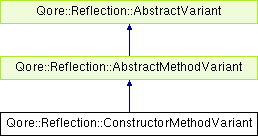|
| object | call (...) |
| | calls the given constructor method variant and returns the object created More...
|
| |
| object | callArgs (*softlist argv) |
| | calls the given constructor method with the given object and returns the object created More...
|
| |
| | constructor () |
| | Throws an exception if called directly; this class can only be instantiated by builtin subclasses. More...
|
| |
| | constructor () |
| | Throws an exception if called directly; this class can only be instantiated by builtin subclasses. More...
|
| |
| string | getAccessModifierString () |
| | returns a string for the access modifier for the method variant More...
|
| |
| AbstractClass | getClass () |
| | Returns the class for the variant. More...
|
| |
| AbstractMethod | getMethod () |
| | Returns the method for the method variant. More...
|
| |
| bool | isAbstract () |
| | returns True if the variant is abstract More...
|
| |
| bool | isFinal () |
| | returns True if the variant is final More...
|
| |
| | constructor () |
| | Throws an exception if called directly; this class can only be instantiated by builtin subclasses. More...
|
| |
| bool | empty () |
| | returns True if the variant has no code implementation; False if it does More...
|
| |
| list< string > | getCodeFlagList () |
| | returns a list of strings of code flags describing the variant More...
|
| |
| int | getCodeFlags () |
| | returns a bitfield of code flags describing the variant More...
|
| |
| list< auto > | getDefaultArgs () |
| | returns a list of default arguments for parameters for the variant; if the variant has no parameters, an empty list is returned More...
|
| |
| int | getDomain () |
| | returns the functional domain of the variant (for builtin variants only) as a bitfield of functional_domain_constants More...
|
| |
| list< string > | getDomainStringList () |
| | returns a list of functional domain strings for the variant (for builtin variants only); an empty list is returned for user variants More...
|
| |
| AbstractReflectionFunction | getFunction () |
| | Returns the abstract function object that contains the variant. More...
|
| |
| list< string > | getModifierList () |
| | returns a list of strings of modifiers describing the variant More...
|
| |
| int | getModifiers () |
| | returns a bitfield of modifiers describing the variant More...
|
| |
| list< string > | getParamNames () |
| | returns a list of parameter variable name for the variant; if the variant has no parameters, an empty list is returned More...
|
| |
| string | getParamString () |
| | returns a string giving a list of the parameters of the variant, including types, variable names, and default values More...
|
| |
| list< Type > | getParamTypes () |
| | returns a list of parameter types for the variant; if the variant has no parameters, an empty list is returned More...
|
| |
| Type | getReturnType () |
| | returns the return type of the variant More...
|
| |
| string | getReturnTypeString () |
| | returns a string for the return type More...
|
| |
| hash< SourceLocationInfo > | getSourceLocation () |
| | Returns the source location of the variant declaration. More...
|
| |
| bool | hasBody () |
| | returns True if the variant has a code implementation; False if not (i.e. it is empty) More...
|
| |
| bool | isBuiltin () |
| | returns True if the variant is a builtin variant More...
|
| |
| bool | isEqual (AbstractVariant variant) |
| | Returns True if the variant passed as an argument is equal to the current object; False if not. More...
|
| |
| bool | isInjected () |
| | returns True if the function or method that the variant belongs to (and therefore the variant itself) has been injected as a dependency injection More...
|
| |
| bool | isMethodVariant () |
| | returns True if the variant is a method variant but not a pseudo-method variant More...
|
| |
| bool | isPseudoMethodVariant () |
| | returns True if the object is a pseudo-method variant More...
|
| |
| bool | isUser () |
| | returns True if the variant is a user variant More...
|
| |
| int | numParams () |
| | returns the number of parameters in the signature More...
|
| |
| string | toString () |
| | returns a string for the variant's signature including any modifiers ("synchronized", "private", etc), the return type, the class name (if any, without a namespace prefix and followed by "::"), and the function or method name followed by parameter types in parentheses More...
|
| |
The class for Qore class constructor method variants.
- Restrictions:
- Qore::PO_NO_REFLECTION
This class cannot be instantiated directly and also cannot be directly inherited by user-defined classes.
- See also
- ConstructorMethod
- Since
- Qore 0.9.0



 Public Member Methods inherited from Qore::Reflection::AbstractMethodVariant
Public Member Methods inherited from Qore::Reflection::AbstractMethodVariant Public Member Methods inherited from Qore::Reflection::AbstractVariant
Public Member Methods inherited from Qore::Reflection::AbstractVariant